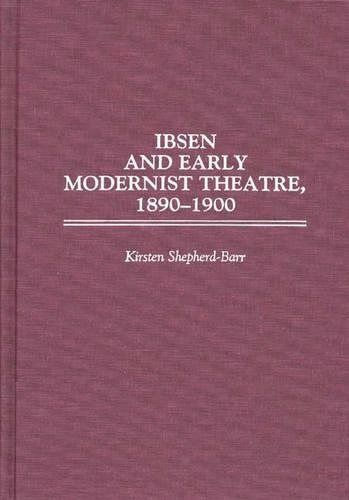
Ibsen and Early Modernist Theatre, 1890-1900
(Hardback)
Publishing Details
Ibsen and Early Modernist Theatre, 1890-1900
By (Author) Kirsten Shepherd-Barr
Bloomsbury Publishing PLC
Praeger Publishers Inc
30th September 1997
United States
Classifications
Tertiary Education
Non Fiction
Literary studies: c 1800 to c 1900
839.8226
Physical Properties
Hardback
224
Description
Best known as the author of such plays as "A Doll's House" and "Hedda Gabler", Henrik Ibsen is one of the most influential figures of modern drama. This book takes Ibsen as a case study for an exploration of early modernist theatre in theory and practice, in text and performance. Modern drama has its roots in the theatrical activity across Europe during the 1880s and 1890s - the period when Ibsen's plays were first being produced in England and France, often by avant-garde or experimental theatrical groups. This study focuses on four of Ibsen's plays and their reception in England and France in the 1890s, specifically in the context of cross-cultural understanding, translation and the diffusion of ideas. It encompasses performance history, textual and translation analysis in several languages, and theatrical criticism. The study provides an understanding of Ibsen's central role in the radical artistic movements of this period, and locates the basis for an early modernist theatre in the "new wave" Ibsen created internationally. His immediate impact on the French Symbolist theatre movement, for example, meant that its avant-garde leaders embraced Ibsen's works as an important exposition of their own radical ideas. Through close cross-cultural exchange, plays like "Rosmersholm" and "The Master Builder", which were heralded as explicitly symbolist in France, helped condition the critical reaction to Ibsen as a symbolist playwright in England as well, and directly influenced the development of the theatre in that direction, however briefly.
Reviews
Rich with references to primary documents of the decade (reviews, essays, letters, and speeches), the study succeeds very well in restoring Ibsen's reputation as a "subversive" dramatist. The comparisons of British and French reactions are especially illuminating of the range of traditional and avant-garde cultural values. This is a valuable contribution to Ibsen studies and to cultural studies of Europe. Extensive notes, substantial bibliography of primary and secondary material. Recommended for all collections serving upper-division undergraduates through faculty.-Choice
Shepherd-Barr's introduction should prove illuminating to anyone interested in the history of modernism....Any teacher or scholar of modernist drama will find Shepherd-Barr's book excellent reading.-Seminar
"Shepherd-Barr's introduction should prove illuminating to anyone interested in the history of modernism....Any teacher or scholar of modernist drama will find Shepherd-Barr's book excellent reading."-Seminar
"Rich with references to primary documents of the decade (reviews, essays, letters, and speeches), the study succeeds very well in restoring Ibsen's reputation as a "subversive" dramatist. The comparisons of British and French reactions are especially illuminating of the range of traditional and avant-garde cultural values. This is a valuable contribution to Ibsen studies and to cultural studies of Europe. Extensive notes, substantial bibliography of primary and secondary material. Recommended for all collections serving upper-division undergraduates through faculty."-Choice
Author Bio
KIRSTEN SHEPHERD-BARR is Assistant Professor of English at North Carolina State University in Raleigh, where she specializes in modern drama. She received her B.A. in English from Yale University and then studied at the University of Oslo on a Fulbright Grant. She completed her doctoral studies in English at the University of Oxford.
